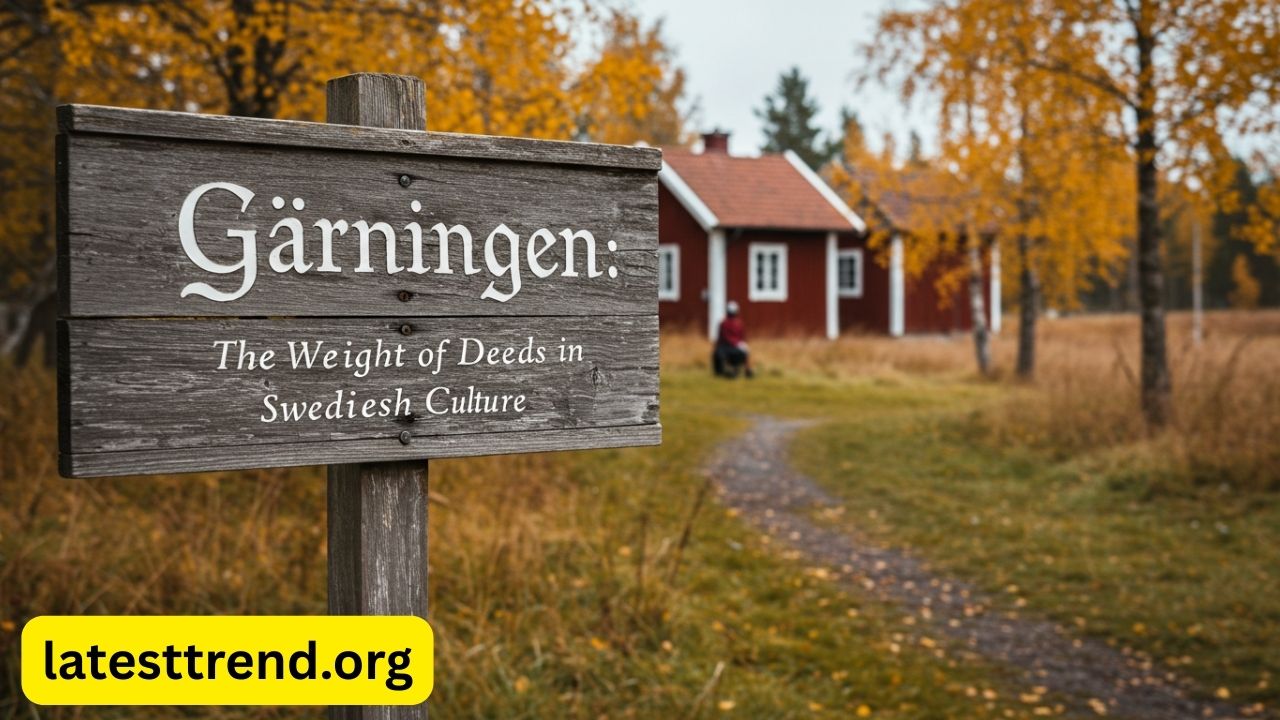Lifesytle
Gärningen: the Weight of Deeds in Swedish Culture

Every language carries words that go beyond simple definitions and touch deeper human values. In Swedish, one such word is gärningen. It is not just a neutral description of an act but a reflection of intention, morality, and responsibility. Whether in literature, law, or everyday speech, gärningen is tied to accountability and the consequences of actions.
In this article, we will explore the meaning, historical background, cultural context, and modern relevance of gärningen, giving you a full understanding of why it continues to hold such importance.
Defining Gärningen
The word gärningen comes from “gärning,” which can be translated as “deed” or “action.” Unlike neutral synonyms such as “handling,” gärningen carries emotional and moral weight. It is often used to describe acts that have a lasting impact either positive or negative.
-
A noble gärning can mean a selfless act of kindness or bravery.
-
A negative gärning usually refers to wrongdoing, misconduct, or even crime.
This dual nature makes the word versatile, allowing it to be used in both uplifting and cautionary contexts.
The Historical Background of Gärningen
To fully appreciate gärningen, we need to look at its roots. The concept is closely tied to Old Norse culture, where deeds were the measure of a person’s honor. Warriors, leaders, and ordinary citizens were remembered not for their words but for their actions.
In Viking times, gärningar (plural) such as generosity, loyalty, and courage were celebrated, while betrayal or dishonor tarnished reputations for generations. This focus on action over intention has been carried into modern Swedish thinking, where responsibility and accountability are highly valued.
Gärningen in Literature and Storytelling
Throughout history, Swedish writers have used gärningen to reflect on the human condition. The word often appears in novels, poetry, and plays to highlight the moral weight of human choices.
-
In older literature, gärningen often symbolized fate or destiny, where every act influenced the future.
-
In crime novels, gärningen is often the central mystery, describing the unlawful act that must be uncovered and judged.
-
In philosophical writing, gärningen is a way to examine the inner conflict between intention and outcome.
By placing emphasis on the deed itself, literature has helped reinforce the cultural importance of gärningen in Swedish society.
Legal Use of Gärningen
One of the most critical applications of gärningen is in the legal field. In Swedish law, gärningen refers directly to the act that has been committed especially in the case of crimes.
When courts review a case, they carefully examine:
-
What the gärningen was (the actual deed).
-
How it was carried out (accidentally, intentionally, or recklessly).
-
The consequences of the gärningen (impact on victims, property, or society).
This shows that gärningen is not just a word but also a legal concept that determines justice, responsibility, and consequences.
Everyday Conversations and Gärningen
Outside of books and law courts, gärningen is still used in everyday conversations, though often in more symbolic ways. For example:
-
“Det var en god gärning” (That was a good deed).
-
“Gärningen kan aldrig glömmas” (The deed can never be forgotten).
-
“Han stod ansvarig för gärningen” (He was held responsible for the deed).
In casual use, it often emphasizes that actions define character and reputation, making it more powerful than simply saying “handling” or “aktivitet.”
Moral and Ethical Weight of Gärningen
What makes gärningen unique is its moral undertone. It goes beyond describing “what happened” and focuses on why it matters.
In ethics and philosophy, gärningen represents:
-
Accountability – Every person is judged by their deeds.
-
Consequence – Actions leave lasting effects on others and society.
-
Moral judgment – A gärning is often labeled as good or bad, shaping how people are remembered.
Thus, gärningen is not just about behavior but also about responsibility and justice.
Cultural Importance of Gärningen in Sweden
Sweden is often associated with values such as fairness, equality, and social responsibility. These values connect strongly with the idea of gärningen, where deeds define integrity.
In society, people are respected not for promises but for what they actually do. Charitable work, environmental action, and social justice movements are all described as positive gärningar. Conversely, corruption or unethical behavior is condemned as negative gärningar, regardless of the excuses behind them.
Gärningen in a Modern Context
In today’s fast-paced, digital world, gärningen is perhaps more relevant than ever. Social media has amplified the way people view actions. A single good gärning, like helping someone in need, can go viral and inspire millions. On the other hand, negative gärningar, such as fraud or abuse, can quickly destroy reputations.
This modern environment reinforces the timeless truth embedded in gärningen: actions define identity. Words may fade, but deeds are remembered, shared, and judged for years.
The Psychological Side of Gärningen
Psychologists often emphasize that deeds can shape not only how others see us but also how we see ourselves. Positive gärningar can build confidence, create meaning, and strengthen social bonds. Negative gärningar, however, can cause guilt, shame, and long-term psychological struggles.
This shows that gärningen is not only a cultural and legal concept but also a deeply personal one that affects mental well-being and self-perception.
Conclusion: Why Gärningen Still Matters
The Swedish word gärningen carries much more than a simple definition. It encapsulates history, morality, justice, and personal responsibility. From its Viking roots to modern-day law courts and social media platforms, gärningen reminds us that deeds speak louder than words.
Understanding gärningen gives us insight not only into Swedish language and culture but also into a universal truth: every action shapes reputation, society, and the legacy we leave behind.















